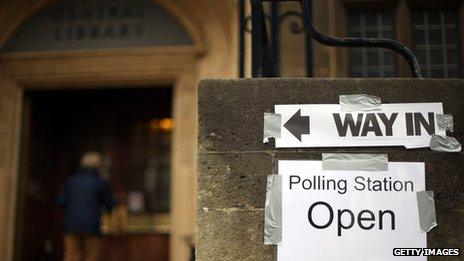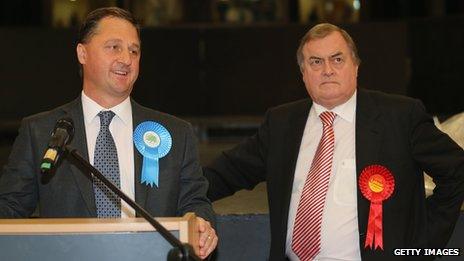Government 'failed to learn lessons' of PCC elections, says watchdog
- Published

The Electoral Commission has insisted the government is to blame for the record low turnout in 2012's police and crime commissioner (PCC) elections.
Just 15% of the electorate bothered to cast a ballot in England and Wales.
Ministers rejected the watchdog's report blaming low turnout on their decision to scrap pre-election mail shots in favour of online information.
The Electoral Commission said it was "disappointed" ministers had "failed to learn lessons" from the PCC polls.
Turnout was at a peacetime low in last November's PCC elections, after which the 41 victors took up their newly created posts replacing police authorities in England and Wales but not London.
Electoral Commission chairman Jenny Watson said: "People told us they wanted more information about candidates so they would know who to vote for.
"Candidates said they found it hard to communicate across large constituencies.
"We are disappointed that the government has not accepted our recommendation that a candidate information booklet should be sent to every household at the next elections. They should reconsider while there is still time."
The commission also reminded the government that it wanted ministers to make clear by May 2014 "how and when they will make changes to the existing PCC legislation ahead of the next polls".

Labour's high-profile Lord Prescott missed out on a PCC post in Humberside
It added: "Any changes will require co-ordination across three government departments and will need to be made in good time so that returning officers and their teams can prepare for a busy set of elections in 2016."
The comments came after the Home Office published its official response to the watchdog's recommendations, which were published in March.
It said: "The government is clear that it is the Electoral Commission's statutory duty to make the public aware of elections.
"The approach adopted for the PCC elections was informed by the government's 'digital by default' strategy for delivery of public services which seeks to modernise and make use of the advances and flexibility that IT provides."
Besides publishing candidate information online, the response continued, "the Home Office ran an advertising campaign to inform people of the purpose of PCCs and informed the public of the web address and phone number. This reached 84% of the adult population in England and Wales through TV advertising alone."
The Electoral Commission had also called on the government to "put in place better medium-term planning" ahead of future legislation.
"Lessons can be learnt from the PCC elections," the Home Office conceded.
"The government will continue to review, especially where elections are held for the first time, what further support may be of benefit to local areas."
- Published14 November 2013
- Published19 March 2013
- Published17 November 2012